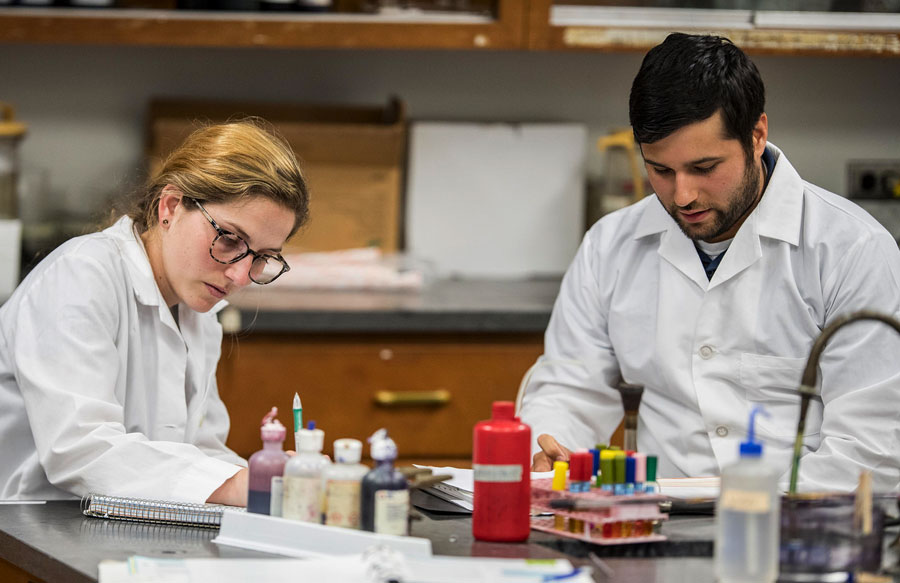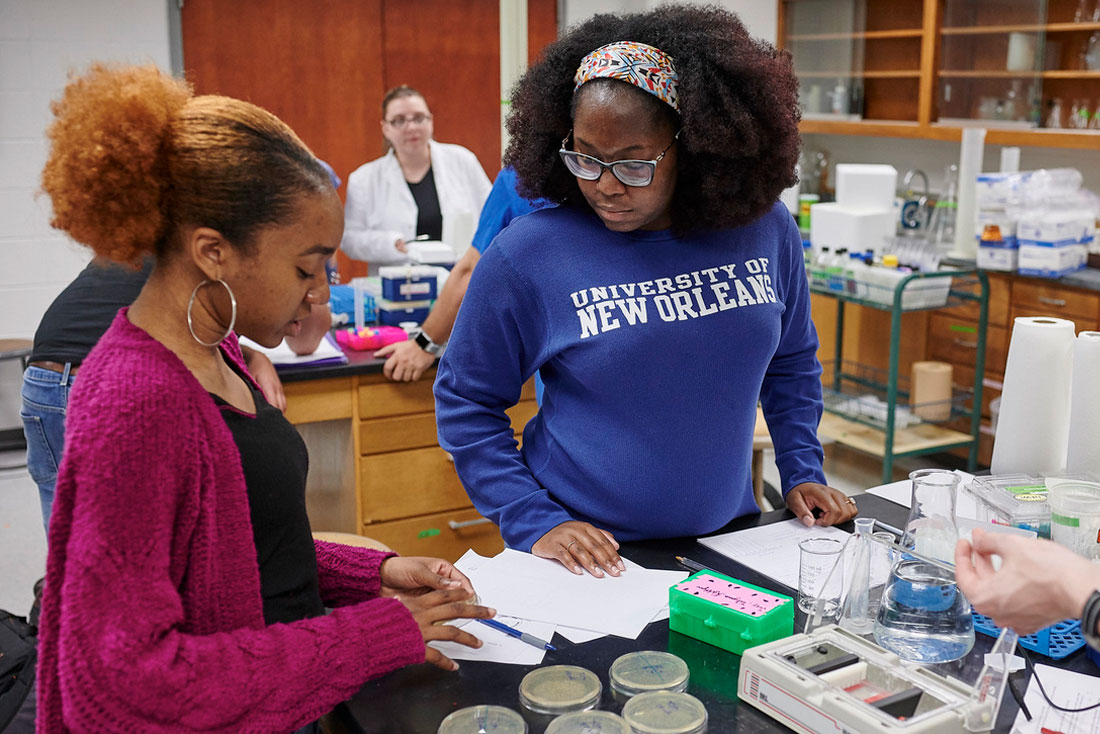“The atmosphere of the biology department at UNO enables me to succeed. The smaller class sizes allow for me to form academic relationships with professors, specifically relationships that encourage question asking, critical thinking, and overall advancement in my studies. In UNO's biology department, my professors know my name and work with me in furthering my education.”
Allison Braud, Sophomore Biology student
Major and Minor Opportunities
B.S. in Biological Sciences
UNO’s undergraduate degree in biology will immerse you fully in the world of the natural sciences and scientific research. Our faculty are committed to providing high-quality instruction and excellent laboratory research opportunities for all undergrad students. Your first two years will consist of a series of required core courses. Then you’ll be eligible to take any upper-level elective course you choose, so you can identify your own area of interest and study exactly what you need to achieve your goals.
The Bachelor of Science in biology is a 120-credit-hour program, including 81 program-specific credits and 39 general education credits. To view degree requirements for the current academic year, please see the UNO Course Catalogue. Catalogues for previous academic years can be found here.
Minor in Biological Sciences
Non-majors can minor in biology by completing at least 18 credit hours in biological sciences and earning a C or better in each. At least 9 hours must be at the 3000 level or above, with at least 9 hours completed at UNO and a maximum of 3 credit hours of BIOS 3092 (research).
Honors in Biological Sciences
The honors program is open to high-performing students pursuing a Bachelor of Science in biology. To be admitted into the honors program, you’ll need to complete BIOS 2014 and 2114, maintain an overall GPA of at least 3.25, and earn at least a 3.5 average in biological science courses. The capstone of the honors program is the senior honors thesis (BIOS 4091), an original work of scholarship on a subject of your choice. After you successfully defend your written honors thesis, you’ll be eligible to graduate with honors.
Pre-Professional Programs
If you plan on pursuing a career in medicine, dentistry, physical therapy, optometry, veterinary medicine, or as a physician assistant, you can tailor your B.S. in biology to make sure you’re a step ahead when it comes time to begin professional school. Each of UNO’s pre-professional programs has its own guidelines and requirements, but all of them will equip you with an excellent foundation for your future career. Learn More
Accelerated B.S. and M.S. Programs
The Accelerated Master’s (AM) Degree offers the opportunity for outstanding students to begin earning credit toward a master's degree while still pursuing undergraduate studies. Our accelerated programs allow a student to complete a master's in less time and at a lower-than-average cost. The main feature of the program is that, while completing their undergraduate study, students may earn up to 12 semester hours of graduate credit that counts as dual credit for both the baccalaureate and master’s degrees. For more details on the combined BS/MS, click here. For more information on the one-year MS program, click here. To apply for the accelerated BS/MS program, click here.
Take a look at the different research opportunities available for undergraduate students at the University of New Orleans.
Read More
The following information is provided to help undergraduates prepare for a career in biology.
Read More
Research Opportunities
Research is a cornerstone of the scientific process—one that teaches you how to consider evidence while revealing how new discoveries are made. As a public research institution, UNO gives you countless opportunities to get involved in research while working toward a bachelor’s degree in biology. Many of our undergrads present their research at conferences, and they are recognized as co-authors in prominent publications along with their faculty advisors.
Research for Course Credit
When you sign up for BIOS 3092, you’ll earn credit toward a B.S. degree in biology by conducting research under the guidance of a professor. Some professors even pay students to work in their labs on ongoing projects.
Louisiana Biomedical Research Network
Every summer, UNO undergraduate and graduate students gather for a 10-week, research-based program with other students from across Louisiana. Learn More
Campus Programs
The Privateer Undergraduate Research and Scholarly UNO Experience (PURSUE) and the College of Sciences Undergraduate Research Program (COSURP) are two on-campus organizations that work to help more undergraduate students participate in research—and also provide funding for lab supplies and student wages.
What You’ll Learn
Biology is a wide and varied field, ranging from the microscopic scale of molecular genetics all the way to large, interconnected ecosystems. But no matter where you choose to focus your studies, a Bachelor of Science in biology from UNO will give you a deeper understanding of the scientific process, the intricacies of research, and the thrill of discovery.
In UNO’s Bachelor of Biological Science program, you will:
- Explore core concepts for biological literacy: evolution, biological structure-function relationships, information flow, pathways and transformations of energy and matter, the connections and interactions of living systems, and more.
- Learn how to communicate scientific information and research findings to a broad audience.
- Examine what goes into the scientific research process and how to critically evaluate scientific literature.
- Interpret and accurately communicate data and analyses, and draw biological inferences from raw data.
- Generate biological data using scientific techniques and instrumentation, as well as laboratory and field techniques.
- Collaborate as part of a laboratory or research group.
- Use quantitative reasoning, modeling, and statistics to describe living systems.
By the time you complete a B.S. degree in biology, you’ll be ready to participate in scientific inquiry and research in medical school, graduate or professional school, a full-time career, or anywhere life takes you next.
Student Learning Outcomes
Student Learning Outcomes specify what students will know, be able to do, or be able to demonstrate when they have completed a program of study.
From UNO to the Scientific Frontier
Jacob Frick has been researching cyanobacteria with mentor Dr. Wendy Schluchter, chair of the UNO Department of Biological Sciences. Thanks to UNO’s support of undergraduate research, Jacob is proud to pursue a career in scientific exploration.
Opportunities across Louisiana
There is no shortage of ways to make research and hands-on learning part of your B.S. in biology right on our New Orleans campus. But you’ll also have the opportunity to study biology across the state of Louisiana, and all along its coast.
Audubon Nature Institute
Together, UNO and the Audubon Nature Institute are addressing some of the most pressing research topics in wildlife conservation and management. Four of our faculty members work with UNO undergraduate fellows in Audubon Nature Institute facilities, tackling projects related to wildlife sustainability in threatened ecosystems and zoo populations.
Louisiana Universities Marine Consortium (LUMCON)
UNO students and faculty can take advantage of LUMCON’s coastal laboratory facilities to study some of the most productive estuaries in the United States, including vast salt, brackish, and freshwater marshes, barrier islands, and offshore environments of the northern Gulf of Mexico.
UNO Pontchartrain Institute for Environmental Sciences
The UNO faculty members who belong to the Institute work to develop practical solutions to environmental challenges in the Pontchartrain Basin, the Gulf of Mexico, and similar costal ecosystems. From water quality and biodiversity to coastal restoration strategies, the Institute is working hard to protect the unique environment of our region.
W.M. Keck Conservation and Molecular Genetics Laboratory
Located in the UNO Department of Biological Sciences, this shared facility gives students and outside researchers access to instruments for research, education, and technical services in the field of molecular science.
What Can You Do with a B.S. in Biology?
Biology is a diverse and exciting field, with plenty of career paths open for you after graduation. A bachelor’s degree in biology might lead to a career in…
- Education
- Environmental Management and Outreach
- Federal and State Government
- Health Care
- Marine Biology
- Medical or Environmental Research Labs
- Museums
- Parks
- Zoology
Courses Offered
- Advanced Microbiology
- Animal Behavior
- Biology of Fishes
- Biochemistry
- Botany
- Comparative Physiology
- Conservation Biology
- Developmental Biology
- Ecology
- Environmental Writing
- Evolutionary Mechanisms
- Genetics
- Histology and Cytology
- Immunology
- Marine Biology
- Molecular Biology
- Plant Taxonomy
- Vertebrate Physiology
- Virology
- And many more!
Biology Student Organizations
As you work toward a B.S. in biology, you can take part in any of these four well-respected student organizations. Get to know your fellow students, make meaningful connections, explore your future field—and enjoy yourself while doing it!
Beta Beta Beta
TriBeta is the honor and professional society for students pursuing a bachelor’s degree in biology. Here, you’ll deepen your interest in biology and your appreciation for research—and work toward having a positive impact on the world. TriBeta is also a service organization, participating in many activities around UNO and in the community.
Alpha Epsilon Delta
AED is a preprofessional honor society for students with an interest in the health sciences. You’ll have the chance to hear from leading speakers in the health professions, meet other students who share your professional goals, and participate in service activities that benefit the entire university community. AED is open to students who have completed three or more semesters of premed work, with an overall GPA of no less than 3.20.
Pre-Dental Society
Students working toward a career in dentistry can participate in the Pre-Dental Society to network with other students, attend meetings and seminars, and learn more about various scholarship opportunities.
Pre-Veterinary Society
As part of the Pre-Vet Society, you can attend two to three meetings per semester featuring guest speakers, gain insight into veterinary school admissions, learn about rewarding careers in veterinary medicine, and more.
UNO Biology Alumni
Our alumni have taken their B.S. in biological sciences and gone on to succeed in careers all over the country—and right here in New Orleans. To give you an idea of what’s possible, here are just a few standout alumni.
- Terence Flotte, M.D. B.S. in Biological Sciences ’82 Celia and Isaac Haidak Professor, Dean of School of Medicine, Provost and Executive Deputy Chancellor University of Massachusetts Medical School
- Dr. Eduardo Gallo, Ph.D. B.S. in Biological Sciences ’04 Assistant Professor of Neuroscience Fordham University
- Fred Rodriguez, M.D., MASCP B.S. in Biological Sciences ’72 Emma Moss Professor of Pathology LSU Health New Orleans School of Medicine



